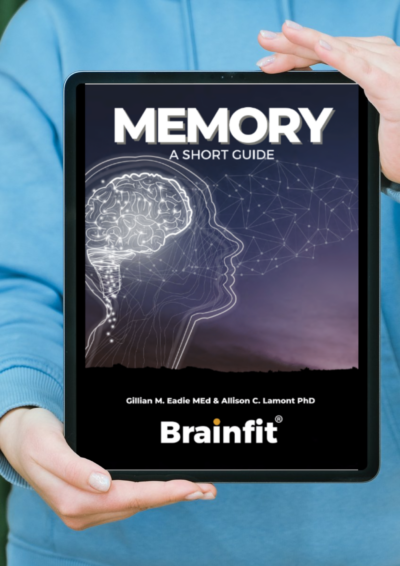I don’t know about you, but I’ve heard a lot of odd things said about memory.
In truth, when I was younger, I didn’t really care!
The other day, though, I was signing some papers when the phone rang. I chatted to my friend for a few minutes or so, arranged a time to meet for coffee, ended the call then promptly signed the next page with my friend’s name.
I couldn’t believe it.
What was I thinking of and where was my memory when I needed it?
So, I’ve been taking my memory a bit more seriously of late.
There are SO many myths, fiction and old wives’ tales about memory and the brain, along with the scientific facts.
Here are some of the questions I’ve been asked
Q. Is my brain like a database with a file to store each memory?
Answer
No. Memory has multiple systems that work together to encode, store, and retrieve your memories. Different parts of your brain specialize in particular types of memory. For example, the left temporal lobe is adapted to remember verbal information, one strip of the frontal lobe processes information about movement, and the occipital lobes process visual information. The brain is far too complicated to store all your memories in one place!
Q. Can I lose my memory?
Answer
No. Memory is not an object you can lose. Rather, it is a set of abilities that can get out of shape or be sharpened. The more ways you can learn to help your memory store information, the easier it will be to remember later.
Q. Are my memories like a photograph, accurate in every detail?
Answer
Memories are not like a camera shot because everything that has happened to you during the time lapse since the experience will colour and change the memory. Even the mood you were in at the time will affect how you will remember the occasion. Our perspectives are always changing. Have you ever returned to a house you lived in when you were very small? When you return as an adult you’ll be surprised at how small the house is – when you were a child it seemed enormous! The house hasn’t changed, but your perspective has.
Q. I can’t remember being a very small child? Should I be worried?
Answer
Many people think there is something wrong with them because they can’t remember anything until they were about four years of age, and even then the memories are fragmented. Often your earliest memories are tiny fragments of a face, perhaps special clothing, or just feel like impressions. In early childhood the brain is just developing and being ‘wired’ to be able to formulate and store memories. Because the first part of the brain to develop is associated with your senses, the first connections you made were linking the senses. The brain parts concerned with higher thinking take many years to develop and this process doesn’t finish until late adolescence. It is no surprise, then, that you can’t remember your first two or three years.
Q. Is it true that we will all lose our memory in old age?
Answer
Yes and no! The answer depends on you! Ageing universally affects all organs so there are some changes in memory and the brain as you get older. It is true you lose neurons with age. It is true the risk of Alzheimer’s increases with age. However, a well-trained memory is resilient and shows comparatively fewer functional signs of ageing than the heart, the joints and the vascular system. All older people do not show memory decline at the same rate. Boomers who keep rich, active lives show much less decline in both memory and thinking abilities. Many older people outperform much younger people in mental abilities, including memory. The old adage “Use it or lose it” definitely applies to memory.
Q. Is it true I can learn in my sleep?
Answer
There have been many companies which sell audio CDs which are supposed to allow you to learn while you sleep. The idea is that you play the CD while you sleep and you will miraculously absorb the information. The truth is, when researched, the only way the sleepers learned was because the sounds woke them up! An important component of effective learning is paying attention. Reading or studying while you are awake will bring much better results.
Q. Am I too old at 60 or 70 to improve my memory?
Answer
Definitely not – the success you experience will depend upon what you do. I love the quotation from Virgil that was repeated in Jonathan Livingston Seagull: “They can because they think they can”. Isn’t that a wonderful way to live your life? With a positive, can-do attitude, and your natural curiosity and enthusiasm for engaging in new experiences, you will restore your youthful memory and probably outperform yourself at 50!

They can because they think they can. Virgil
For more help, check how your brain works and improving your memory. There are many other articles Memory.Foundation. Or Contact Us
We’d love to hear from you and we always answer queries.
Do you have a memory myth you’d like to share with us below?






My mother had Alzheimer’s when she died. Her father died in the Porirua Mental Hospital so maybe he also had Alzheimer’s. The myth is that Alzheimer’s is in the family so I am likely to suffer from this disease also.
I certainly notice deterioration in my memory – especially the really short term things. Almost as soon as someone has told me something I forget it.
I often forget things almost immediately after someone has told me something.
love to know more and get improvement.
I really enjoy quizzes and would love to see a quiz after each chapter of Memory Tune.
Really enjoying the course
That’s a great idea, Rajinder. So glad you are enjoying each session!
Remembering to ‘stay in the moment’ when you are being told something is the secret. It is so easy to let the mind wander even when you are hearing someone’s name! Focus, focus. (and it’s not easy ….)
I’m glad you recognize that this belief is a myth for all but a tiny percentage of people. This article will bring people comfort https://www.brainfit.world/will-i-get-alzheimers-too/ The most important thing to remember is that most of us won’t develop dementia and it is so important that we don’t live as if we will.
At year beginning was handed over to Auckland DHB from my doctor. Tested for Dementia to a brain scan. Never found results but said was 82%. Whatever that meant. Know do not have Dementia. From experience to go on living and enjoying each moment, gratitude, no regrets , Brainfit keeps us all in the know ❤️
What an excellent response Gillian re alzheimers/dementia, just love it.
Absolutely! I couldn’t agree more. We use all of the abilities we have for as long as possible – and as fruitfully as possible!
I have struggled with cognitve issues as I have advanced in years, it has really worried me. Having been in Ina Meetens class in Blenheim, I am a lot more confident that I can look forward to many more years without “losing my marbles”!!
I now have a real purpose in life, and I think I can help others as well.
Thank you
That’s wonderful news! I’m so glad to know that our Brainfit® for Life has been so beneficial for you. Thousands of people have now been through the training with our wonderful Brainfit® coaches and I’m delighted to say that their experience has been just as fulfilling as yours. I’m so glad to see your comments here and I know Ina will be too.